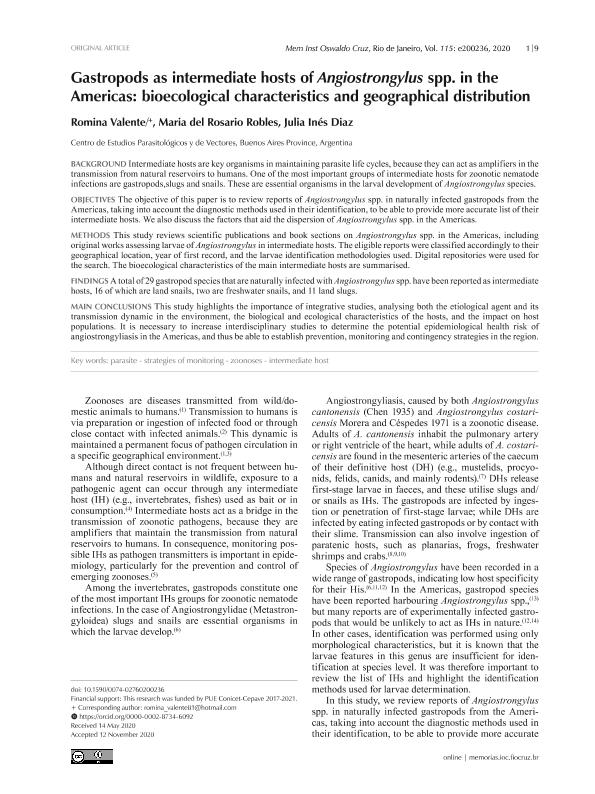Mostrar el registro sencillo del ítem
dc.contributor.author
Valente, Romina

dc.contributor.author
Robles, Maria del Rosario

dc.contributor.author
Diaz, Julia Inés

dc.date.available
2021-10-01T14:55:37Z
dc.date.issued
2020-11-27
dc.identifier.citation
Valente, Romina; Robles, Maria del Rosario; Diaz, Julia Inés; Gastropods as intermediate hosts of angiostrongylus spp: In the americas. Bioecological characteristics and geographical distribution; Fundação Oswaldo Cruz; Memórias do Instituto Oswaldo Cruz; 115; 11; 27-11-2020; 1-9
dc.identifier.issn
1678-8060
dc.identifier.uri
http://hdl.handle.net/11336/142242
dc.description.abstract
BACKGROUND Intermediate hosts are key organisms in maintaining parasite life cycles, because they can act as amplifiers in the transmission from natural reservoirs to humans. One of the most important groups of intermediate hosts for zoonotic nematode infections are gastropods,slugs and snails. These are essential organisms in the larval development of Angiostrongylus species. OBJECTIVES The objective of this paper is to review reports of Angiostrongylus spp. in naturally infected gastropods from the Americas, taking into account the diagnostic methods used in their identification, to be able to provide more accurate list of their intermediate hosts. We also discuss the factors that aid the dispersion of Angiostrongylus spp. in the Americas. METHODS This study reviews scientific publications and book sections on Angiostrongylus spp. in the Americas, including original works assessing larvae of Angiostrongylus in intermediate hosts. The eligible reports were classified accordingly to their geographical location, year of first record, and the larvae identification methodologies used. Digital repositories were used for the search. The bioecological characteristics of the main intermediate hosts are summarised. FINDINGS A total of 29 gastropod species that are naturally infected with Angiostrongylus spp. have been reported as intermediate hosts, 16 of which are land snails, two are freshwater snails, and 11 land slugs. MAIN CONCLUSIONS This study highlights the importance of integrative studies, analysing both the etiological agent and its transmission dynamic in the environment, the biological and ecological characteristics of the hosts, and the impact on host populations. It is necessary to increase interdisciplinary studies to determine the potential epidemiological health risk of angiostrongyliasis in the Americas, and thus be able to establish prevention, monitoring and contingency strategies in the region.
dc.format
application/pdf
dc.language.iso
eng
dc.publisher
Fundação Oswaldo Cruz

dc.rights
info:eu-repo/semantics/openAccess
dc.rights.uri
https://creativecommons.org/licenses/by/2.5/ar/
dc.subject
INTERMEDIATE HOST
dc.subject
PARASITE
dc.subject
STRATEGIES OF MONITORING
dc.subject
ZOONOSES
dc.subject.classification
Otras Ciencias Biológicas

dc.subject.classification
Ciencias Biológicas

dc.subject.classification
CIENCIAS NATURALES Y EXACTAS

dc.title
Gastropods as intermediate hosts of angiostrongylus spp: In the americas. Bioecological characteristics and geographical distribution
dc.type
info:eu-repo/semantics/article
dc.type
info:ar-repo/semantics/artículo
dc.type
info:eu-repo/semantics/publishedVersion
dc.date.updated
2021-09-06T17:05:22Z
dc.journal.volume
115
dc.journal.number
11
dc.journal.pagination
1-9
dc.journal.pais
Brasil

dc.journal.ciudad
Rio de Janeiro
dc.description.fil
Fil: Valente, Romina. Consejo Nacional de Investigaciones Científicas y Técnicas. Centro Científico Tecnológico Conicet - La Plata. Centro de Estudios Parasitológicos y de Vectores. Universidad Nacional de La Plata. Facultad de Ciencias Naturales y Museo. Centro de Estudios Parasitológicos y de Vectores; Argentina
dc.description.fil
Fil: Robles, Maria del Rosario. Consejo Nacional de Investigaciones Científicas y Técnicas. Centro Científico Tecnológico Conicet - La Plata. Centro de Estudios Parasitológicos y de Vectores. Universidad Nacional de La Plata. Facultad de Ciencias Naturales y Museo. Centro de Estudios Parasitológicos y de Vectores; Argentina
dc.description.fil
Fil: Diaz, Julia Inés. Consejo Nacional de Investigaciones Científicas y Técnicas. Centro Científico Tecnológico Conicet - La Plata. Centro de Estudios Parasitológicos y de Vectores. Universidad Nacional de La Plata. Facultad de Ciencias Naturales y Museo. Centro de Estudios Parasitológicos y de Vectores; Argentina
dc.journal.title
Memórias do Instituto Oswaldo Cruz

dc.relation.alternativeid
info:eu-repo/semantics/altIdentifier/doi/http://dx.doi.org/10.1590/0074-02760200236
dc.relation.alternativeid
info:eu-repo/semantics/altIdentifier/url/https://memorias.ioc.fiocruz.br/article/10771/0236-gastropods-as-intermediate-hosts-of-angiostrongylus-spp-in-the-americas-bioecological-characteristics-and-geographical-distribution
Archivos asociados
